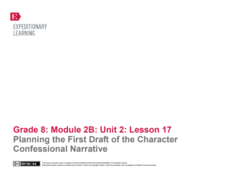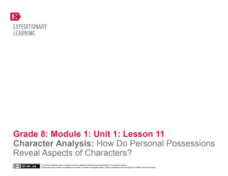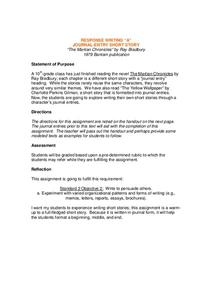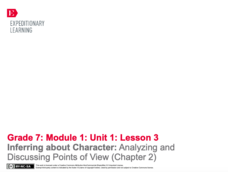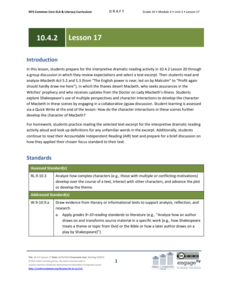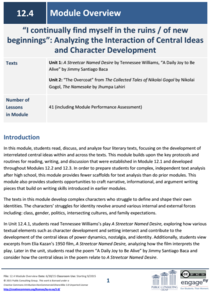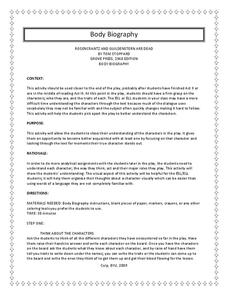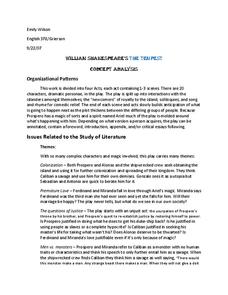Scholastic
What a Character!
How do you know what traits a character displays in a story? Learners select a character and find list three traits for this character, explaining why they chose each trait. They then put this information together into a paragraph or essay.
Curated OER
My Antonia: Biopoem Writing Strategy
Explore the characters in My Antonia by Willa Cather with a biopoem assignment. Pupils use the provided format to write their poems about any character from the book.
EngageNY
Planning the First Draft of the Character Confessional Narrative
Scholars read and analyze a model character confessional narrative to help guide their writing. Then, they plan the first draft of a character confessional based on Shakespeare's A Midsummer Night's Dream.
Literacy Design Collaborative
Exploring Character Development in The Watsons Go to Birmingham - 1963
How did the Civil Rights Movement affect young people in the United States? Scholars read Christopher Paul Curtis' novel, The Watsons go to Birmingham - 1963. Next, they write compare and contrast essays showing how the main...
EngageNY
Character Analysis: How Do Personal Possessions Reveal Aspects of Characters?
Learners use a jigsaw activity to examine characters in "Left Behind." Each group member focuses on a different character and then regroups to those with the same focus. Class members then return to their home groups for discussion...
Novelinks
The Martian Chronicles: Response Writing
Follow the format of Ray Bradbury's The Martian Chronicles with a journal-writing activity. Readers choose a character and examine the character's life and circumstances through brainstorming, research, and discussion before...
Houghton Mifflin Harcourt
Core Analysis Frame: Fiction
Dig into any piece of fiction with a series of analysis questions. There are two levels of questions provided: basic and in-depth. The basic questions can be copied double-sided onto a single piece of paper, while the in-depth questions...
Louisiana Department of Education
Out of the Dust
The Grapes of Wrath may be the most famous novel set during the Dust Bowl, but what other stories cover the same time? The unit focuses on the Karen Hesse novel Out of the Dust. Learners keep a timeline of the Dust Bowl, maintain a...
Brigham Young University
Introducing the Text and Learning the Process of Script Analysis
Where do directors and set designers get their ideas so that the set they build creates the mood and atmosphere the director wants for a production? From the script! Introduce theater high schoolers to the script analysis techniques used...
EngageNY
Analyzing Character: Who is Lyddie?
Character analysis can help readers feel more connected to a literary text. Scholars explore the topic by writing an acrostic poem about the main character from Katherine Paterson's novel, Lyddie. Then, pupils watch a short video to help...
EngageNY
Inferring about Character: Analyzing and Discussing Points of View (Chapter 2)
Readers engage in discussion with partners to answer questions about A Long Walk to Water by Linda Sue Park. Next, they complete exit tickets, writing about how the author creates different points of view for her characters.
EngageNY
Inferring about Character: Close Reading of the Poem “Inside Out” and Introducing QuickWrites
Grab a partner! Scholars partner up to take a second look at the verse novel Inside Out & Back Again. They discuss questions about and connections to the novel and then learn how to complete a Quick Write task properly. To finish,...
Curriculum Corner
Fiction Graphic Organizers
Get an in-depth look into a narrative text with a three-page worksheet that examines a story's character—actions, sayings, thoughts, and appearance—setting, and challenges scholars to write a brief summary about what they've read.
EngageNY
Grade 10 ELA Module 4: Unit 2, Lesson 17
Madness, violence, despair—the titular character of Shakespeare's Macbeth is spiraling out of control. Pupils first explore the topic with a collaborative jigsaw discussion. At the end of the instructional activity, they write about how...
Curated OER
Express Yourself Lesson Seed 13: Character Development 2
Building upon prior lessons in the series, this reading and writing exercise requires pupils to look back at their own writing, track character development in the novel The Cay, and analyze how Phillip has changed. The reading focus is...
EngageNY
Grade 12 ELA Module 4: Literary Analysis
Does identity come from within, or do external forces shape it? Explore the complex identity concept with a two-unit module for 12th-grade language arts. The first unit uses A Streetcar Named Desire by Tennessee Williams and "A Daily Joy...
Fluence Learning
Writing About Literature: Comparing and Contrasting Characters in Heidi
Scholars read excerpts from the story, Heidi, in a three-part assessment that focuses on comparing and contrasting characters. Each part contains three tasks that challenge learners to discuss, answer comprehension...
Maine Content Literacy Project
Process of Reading
Assist your pupils with literary analysis by discussing and exploring theme. This plan, the twelfth in a series of fourteen, builds in some time to explore theme as a class. Learners also blog about the main event in their stories and...
Curated OER
Monster: Guided Imagery
How would you feel if you were on trial for murder—and you were only 16 years old? Put yourself in Steve Harmon's shoes before reading Monster by Walter Dean Myers. Kids listen to music that fits the theme of the book before...
Polk Bros Foundation
I Can Infer Predictions Based on an Analysis of Motive
Use a character or person's motivation as the basis for a prediction of that character or person's next action. Pupils select an individual from their reading, copy a quote, write down an inference about that character's motives, and...
Sundance
Teaching Strategies: The Giver
Can utopia be achieved? Included here are three literature worksheets to pair with Lois Lowry's The Giver. Pupils work in groups to come up with solutions to society's issues, individuals back up a statement related to a topic in the...
Brigham Young University
Rosencrantz and Guildenstern Are Dead: Body Biography
Pause in your reading of Rosencrantz and Guildenstern Are Dead to take an in-depth look at the characters. Learners examine a chosen character by drawing a body and assigning quotes and traits to specific areas of the body, thinking...
Novelinks
The Tempest: Concept Analysis
Use a handy concept analysis guide as you begin your unit on William Shakespeare's The Tempest. With character descriptions, literary themes, and anticipated affective issues, the guide can help those new to using The Tempest craft...
Louisiana Department of Education
Hatchet
Accompany a novel study of Hatchet by Gary Paulson with a unit consisting of 16 lessons focused on physical and emotional survival. Reading the story along with a variety of informational texts, scholars compare and contrast reading...


